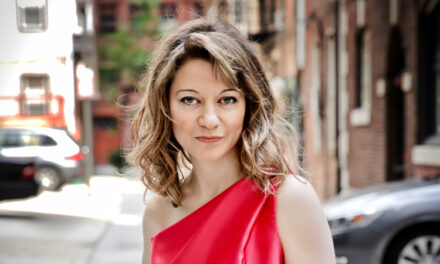Beg, borrow, or somehow finagle a ticket to one of the remaining two performances of Così fan tutte being presented by North Carolina Opera. The intimate Fletcher Opera Theater is the ideal venue for classical operas of Mozart. The composer demands superlative, versatile young singers whose mastery of individual technique is matched with their abilities in ensemble. This production has these virtues, nay necessities, in spades. Director Michael Shell‘s staging is traditional, in the 18th century period, with no motorcycles or any such hint of a “Euro-trash” staging! Conductor Timothy Meyers leads a pit orchestra filled with some of the finest free-lancers available.
Mozart’s Così Fan Tutte only came into its own in the post-WWI period, with important revivals at Glyndebourne, England in the 1930s. The Romantic period, with its idealized image of women on pedestals, viewed the opera as an immoral or cynical farce married to sublime music. The basic plot, a wager on women’s lack of constancy, is common in literature from Boccaccio to Cervantes. Lorenzo da Ponte, Mozart’s librettist, litters his text with a plethora of quotations and allusions.
Don Alfonzo, the older friend of Ferrando and Guglielmo, who rave about the virtues of their lovers Dorabella and Fiordiligi, respectively, bets his friends that he can prove their goddesses to be mere weak mortals within a day. To do this he has his friends, who are soldiers, disguise themselves as wildly costumed Albanians. Don Alfonzo bribes the women’s maid, Despina, who eventually takes on the guise of first a doctor and disciple of Count Mesmer and, later, as a pedantic notary. The “Albanians,” paired opposite their soldierly choices, eventually convince the women to marry them. A sudden return of the soldiers leads to the unmasking of the farce, and in most productions, a return to the original couplings after apologies and gained wisdom.
This production is cast from strength across its roster and features some rising native North Carolinian stars.
Tenor Tyler Nelson has the ideal dulcet, warm and melodious tone for Mozart. His seamless, melting “Un’aura amorosa” (“A breath of love”) was enchanting while his cavatina “Tradito schernito” marvelously juxtaposes his bitter disappointment with his love for Dorabella. Brevard NC native Sidney Outlaw was superb as Guglielmo. His firm, warm baritone was a constant joy. His “Donne mie, le fate a tanti” (“I would like a word with all you lovely ladies”) with its generalized echo of Figaro’s cry against women’s infidelity, contrasted nicely with his personalized anguish at Fiordiligi’s final yielding to Ferrando. It has been a delight to record Outlaw’s artistic growth since his undergraduate days in David Holley’s opera program at UNC Greensboro. Bass-baritone Jake Gardner combined solid vocalism with perfectly judged comic acting in the role of Don Alfonso.
The original soprano who sang the role of Fiordiligi is supposed to have asked Mozart to compose some showy parts for her. She may have gotten more than she had wished since the role abounds in fiendishly difficult coloratura, vocal leaps, and florid runs. The composer would have been pleased with soprano Elizabeth De Trejo‘s bravura performance whether in the famous “Come scoglio” (“Like a Rock”) or her last desperate attempt to flee temptation “Per pieta.” Mezzo-soprano Cecelia Hall is a NC native, and she combines a solid lower vocal range with considerable comic skills as Dorabella, the weaker of the two sisters. Soprano Hailey Clark, another NC Native, brought a gorgeous bright high range to the role of the traditional worldly-wise servant Despina.
The chorus, prepared by Scott Macleod, was excellent. Some of its members doubled as extras (servants, etc.); in these parts the blocking was also excellent. I missed the traditional giant horseshoe magnet used, Mesmer-like, to pull out the poison from the Albanians. Another quirk was to have an extra bearing a three-mast model warship on a pole, like a parade of icons across the back of the set and the front of the stage.
Conductor Timothy Myers kept tight coordination between his excellent pit orchestra and the cast on stage. There was some superlative Mozart playing coming from such instrumentalists as flutist Pam Nelson, clarinetist Jimmy Gilmore, oboist Joe Robinson, and Josh Cheurvont on French horn, to name a few. The electronic harpsichord continuo was ably played by Christopher Ray.
The unit set designed by David Gordon and the costumes designed by Howard Tsvi Kaplan, both for the Sarasota Opera, were excellent. Driscoll Otto‘s lighting designs were effective.
The opera will be repeated October 5 at 8:00 p.m. and October 6 at 2:00 p.m. For details, see the sidebar.











